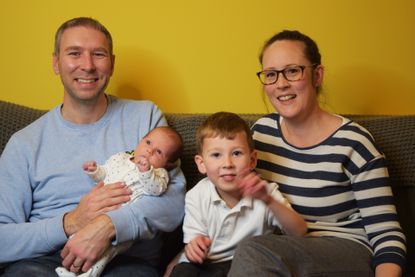“We’ve made our family finances as green as possible”
Isabel decided to go green with her family finances, current account, ISA and pension during the first lockdown in 2020


The Mack family tells us how they have gone down the green family finances route to help build a better future for their children.
It was during the first lockdown of March 2020 that Isabel Mack decided to go green with her current account, stocks and shares ISA, pension and children’s savings accounts. “I had been so surprised by an Instagram post explaining how a green pension is way more effective at cutting your carbon footprint than giving up flying and changing your energy provider. I had already switched my energy provider, bought an electric car and got into buying second-hand where possible so this seemed the obvious next thing to do.”
While others were learning how to make sourdough bread or doing online workouts during lockdown, Isabel started researching current accounts. Banks finance climate change through the businesses they invest in: £150bn was invested in fossil fuels by UK banks between December 2015 when the Paris Agreement (an international treaty on climate change) was agreed and September 2019. Changing your current account is one way to green your finances.
“I read the ethical consumer guide on bank accounts and the SwitchIt website. I decided to make a decision based on which current accounts are rated highly and my preference to not pay a fee. I switched to Nationwide - my husband Mark was pleased as he already banked with them - and we moved our joint account to the Coop. It was easy and free to switch via the Current Account Switch Service.”
The 39-year-old in Winchester decided to next cut out fossil fuels from the stocks and shares ISA and self-invested personal pension (SIPP) she holds with Hargreaves Lansdown. “I looked at the funds in my ISA and pension, their holdings and their motive. I then looked for funds with high ESG (Environmental, social, and governance) objectives and those that in particular support energy transition such as Schroder Global Energy Transition Fund.”
Now about 40% of her ISA and 75% of her SIPP is held in funds with high ESG objectives or include holdings in ESG-rated companies. “My main criteria was to cut out fossil fuels and find something that satisfies my attitude to risk. My non-ESG funds have a lower risk profile and I may make further changes here in the future.”
Isabel admits this research to change her ISA and pension investments took longer. “There was more research to do and it helped that my husband works in finance and has an interest in ESG. I would have considered speaking to an independent financial advisor otherwise.”
Look After My Bills Newsletter
Get the best money-saving tips, tricks and deals sent straight to your inbox every week. Make sense of your money in partnership with The Money Edit.
Thinking about green family finances? Do some research to avoid greenwashing
It’s important to do as much research as possible or seek advice from an advisor on how to spot greenwashing. This is when a fund or company claims to be more environmentally friendly than it actually is.
Isabel, who is the founder of Party Kit Network, which offers sustainable party kit hire, has recently opened green savings accounts for her three-week-old daughter Stevie and four-year-old son Harlan. “I had heard of ethical bank Triodos so did some reading about them and opted for their Right Start Saver for any birthday and Christmas money they receive.”
She is open to switching her mortgage provider for a greener option. “I’m not sure how practical that would be but will consider when our current fixed term ends.”
Her advice? “Start with your bank account – it’s the easiest way to begin and can have a much greater impact than ethical changes to other areas of our lives.”
Katie is staff writer at The Money Edit. She was the former staff writer at The Times and The Sunday Times. Her experience includes writing about personal finance, culture, travel and interviews celebrities. Her investigative work on financial abuse resulted in a number of mortgage prisoners being set free - and a nomination for the Best Personal Finance Story of the Year in the Headlinemoney awards 2021.
-
 Three energy firms pay £8m in switching compensation - has your provider paid out?
Three energy firms pay £8m in switching compensation - has your provider paid out?More than 100,000 customers have received compensation after changing providers, but is now a good time to switch energy suppliers?
By Tom Higgins Published
-
 Save £300 on your supermarket shop with cashback accounts
Save £300 on your supermarket shop with cashback accountsBanks, credit card companies and cashback sites are all offering cashback on your supermarket shop, but can you use them all to max out your savings?
By Vaishali Varu Published
-
 Save £300 on your supermarket shop with cashback accounts
Save £300 on your supermarket shop with cashback accountsBanks, credit card companies and cashback sites are all offering cashback on your supermarket shop, but can you use them all to max out your savings?
By Vaishali Varu Published
-
 More than 150,000 grandparents missing out on £1,500 state pension uplift: how to claim
More than 150,000 grandparents missing out on £1,500 state pension uplift: how to claimGrandparents who provide childcare by looking after their grandchildren could be missing out on valuable state pension money worth thousands. We look at how much extra you could get and if you’re eligible
By Stephanie Baxter Published
-
 Can you reclaim bank charges?
Can you reclaim bank charges?If you’ve incurred bank charges over the years, these can add up to hundreds of pounds – but can you get your money back? We look at whether you can make a claim and how to do it
By Stephanie Baxter Published
-
 HSBC extends deadline for customers to secure bigger interest-free overdraft
HSBC extends deadline for customers to secure bigger interest-free overdraftHSBC customers now have until 10 May to increase their interest-free overdraft limit from £25 to £500. First Direct, Lloyds and Nationwide also offer similar support. We explain everything you need to know
By Katie Binns Last updated
-
 New banking hub locations revealed - is there one near you?
New banking hub locations revealed - is there one near you?The rise of banking hubs is in response to a stream of local branch closes. With more planned to launch soon, we look at what services they offer and where you can find one
By Stephanie Baxter Published
-
 April 2023 premium bond winners revealed - are you a millionaire?
April 2023 premium bond winners revealed - are you a millionaire?Two premium bond holders have won £1 million each this month and there are many other prizes for another 5,018,742 winners in April. We look at how to find out if you’ve won
By Stephanie Baxter Published
-
 Get more for your money with a stocks and shares ISA
Get more for your money with a stocks and shares ISAA stocks and shares ISA could grow your money faster than a cash ISA. But what is it exactly and who is it suitable for?
By Ruth Emery Published
-
 Help to Save scheme extended – act now for £1,200 bonus
Help to Save scheme extended – act now for £1,200 bonusThe government has extended the Help to Save scheme - we explain how it works and who is eligible
By Kalpana Fitzpatrick Last updated